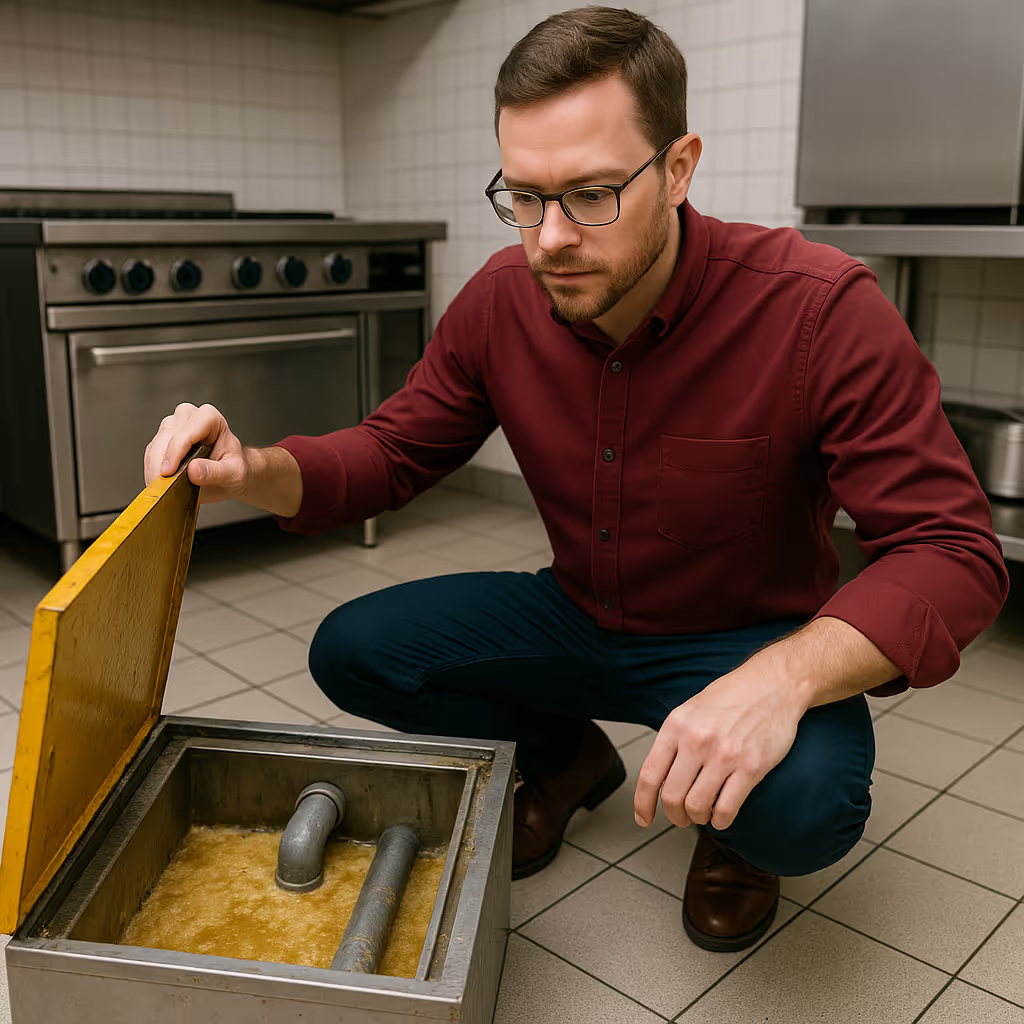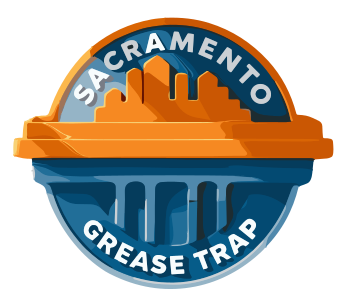F.O.G. Management for Business | Why Fats, Oils & Grease Matter

If your line slows, tickets stack up and guests wait. The fastest way to keep drains moving is to control fats, oils, and grease, or F.O.G. In the first 100 words you’ll get a simple path to do grease disposal right, so your team stops clogs before they start, passes inspections with less stress, and avoids surprise shutdowns.
Grease and oils can clog pipes, leading to clogging in the sewer system, which causes backups and environmental hazards. Sacramento Greasetrap built this playbook from real Sacramento service calls, so it’s practical, fast, and easy to train new staff on day one.
Cities spend serious money clearing grease clogs and treating high-FOG wastewater. For example, Portland says it “spends millions of dollars each year” dealing with grease-caused blockages and extra treatment. Grease blockages not only disrupt the sewer system but can also lead to pollution in public streets, affecting both infrastructure and the environment. That cost is preventable when kitchens keep F.O.G. out of pipes with basic habits and the right maintenance cadence
What Is Grease Disposal?
Grease disposal is the safe handling and properly disposing of fats, oils, and grease from kitchen operations so they never enter drains. It combines daily scraping, proper storage, using the right disposal methods to safely dispose of grease, scheduled grease trap or interceptor service, and licensed hauling or recycling. Done right, it prevents clogs, avoids fines, and keeps kitchens inspection-ready.
How To Dispose Of Cooking Grease In Commercial Kitchens
City rules are clear: don’t put F.O.G. down sinks or disposals. Businesses must install, operate, and maintain properly sized grease interceptors. Employees play a crucial role in properly handling cooking oil and grease. Training employees to follow best practices for managing frying oil, kitchen oil, and greasy dishes is essential for compliance and environmental protection.
Daily Line Checklist
- Dry-wipe pans, griddles, and plates before washing.
- Scrape greasy dishes thoroughly to prevent grease from entering the drain.
- Scrape solids into a bin. Use sink strainers to catch particles.
- Pour used frying oil and kitchen oil into a covered container for kitchen grease recycling or licensed pickup, removing oil after frying to maintain food quality and safety.
- Dispose of cooled, solidified grease in the garbage, never pour it down the drain.
- Keep yellow grease drums closed and labeled.
- Log quick visual checks of trap or interceptor sight levels.
Weekly And Monthly Tasks
- Verify pick-ups from your hauler and file the manifest.
- Inspect baffles, inlet, outlet, and gaskets during scheduled service.
- Follow the “25 percent” rule for cleaning frequency to avoid carry-over and costly line-jetting.
Pro tip: Post the checklist at the dish pit and prep line.
Watch-out: Hot water and soap don’t “wash grease away”; they push it farther down until it cools and hardens.
Used Cooking Oil Recycling: Turning Waste Into Value
Why recycle
- Responsible disposal that turns waste into value
- Protects against sewer backups and clogged drains
- Reduces environmental footprint by creating renewable fuels (biodiesel)
How it works
- After cooking, place used oil in dedicated, covered containers—never down sinks or drains
- Cooking oil collection companies provide scheduled pickups to keep operations smooth and kitchens clean
- Collected oil is filtered, purified, and recycled into renewable fuels, avoiding landfills and environmental hazards
Best practices
- Use the right containers; keep oil cool and covered
- Arrange regular collection to prevent spills, contamination, and backups
- Keep food scraps and paper towels out of oil containers (compost/recycle separately)
Grease Disposal System Options And Compliance
Grease Traps vs Grease Interceptors
- Grease traps are smaller, often under-sink units for low to moderate flow.
- Grease interceptors are larger, typically outdoor, and required for most food service establishments. Cities state that interceptors must be correctly installed, sized, and maintained to prevent sewer issues.
Quick comparison
- Setup: Trap is faster to install; interceptor handles higher volumes.
- Cleaning: Both require routine pump-outs; interceptors typically on a 30–90 day cadence based on load.
- Records: Keep logs and manifests on-site for inspections.
Sizing, The 25 Percent Rule, And Records
Municipal guidance highlights the 25 percent capacity threshold as the trigger for cleaning and warns against relying on additives. Keep written logs to document dates, volumes, and hauler info.
Internal help: See our F.O.G. explainer to connect the dots between kitchen habits and city programs with a clear kitchen grease disposal overview.
Restaurant Grease Disposal: Step-By-Step Playbook
- Capture at the source
- Scrape plates and pans. Keep strainers in sinks. Remind dish staff that restaurant grease disposal starts before anything reaches water.
- Store correctly
- Use covered containers for yellow grease and secure drums outside.
- Service on schedule
- Book routine interceptor or trap service before you hit 25 percent capacity. Schedule pickups every week or as needed to prevent overflows and odors.
- Haul or recycle
- Use licensed haulers. Schedule a service to collect used grease regularly with a collection truck. Some businesses can sell their used cooking oil to licensed recyclers for additional revenue. For household-style volumes in community events or pop-ups, cities promote “Can it, cool it, toss it” or drop-off kitchen grease recycling sites.
- Document everything
- Keep manifests, service notes, and a simple log binder near your manager’s desk
Pro tip: Put your hauler phone number on the dish room wall and on the monthly scheduler.
Watch out: Enzymes can emulsify F.O.G. and push it downstream. Many city pages caution against relying on additives instead of pump-outs.
Internal help: Build a cadence with a commercial grease disposal plan and service windows that fit your rush.
Grease Disposal System Options And Compliance (Applied)
Need expert service that includes manifests and photos after every visit? Sacramento Greasetrap offers cleaning and pumping with inspection-ready paperwork.
- Book grease disposal system cleaning with our techs:
- Link: grease disposal system cleaning service
- Align pump-outs with menus and volume:
- Link: used grease disposal and pumping
- Train your team on daily BMPs:
- Link: food oil disposal and grease disposal steps
Mistakes And Myths That Quietly Cost You
- “Additives replace pumping.” Not true; they can move grease downstream and trigger overflows.
- “Hot water solves it.” It cools later and hardens in pipes.
- “Only big restaurants need interceptors.” Cities require properly sized devices for food service establishments.
- “We can dump at the end of the shift.” F.O.G. discharges are prohibited and cause backups.
- “We’ll remember to clean without logs.” Inspections expect records.
- “Residential rules apply to our café.” Commercial kitchens face stricter rules; follow a documented plan.
Internal help: Read our full rules overview for grease waste disposal do’s and don’ts.
Proof And Payoff: How Better Grease Disposal Drives Results
City pages show that poor F.O.G. control leads to backups, overflows, and bigger public costs. Kitchens that keep F.O.G. out of drains avoid emergency calls, protect reputation, and breeze through inspections. Proper grease disposal not only ensures a clean, efficient operation but also improves customer satisfaction by providing a reliable and pleasant experience.
Taking proactive steps to manage grease can save businesses money on emergency repairs and help protect the environment. Sacramento Greasetrap clients get a right-sized cadence, cleaner floors, and faster closeouts after service.
Pro tip: Tie service dates to your inventory cycle and add a 2-minute log check to the weekly manager walk-through.
Watch out: Don’t let drums overflow. Lids must stay closed and labeled.
Conclusion: A Clean, Compliant Path Forward
When you make grease disposal a habit, your team works faster, your drains stay clear, and inspections feel routine. Use the checklists above, schedule service before you hit 25 percent capacity, and keep every manifest. Sacramento Greasetrap can set up the cadence, train your crew, and handle the paperwork so you can focus on guests.
Why move now
- Fewer clogs and emergency calls
- Faster cleanups and better morale
- Stronger compliance and easier inspections
- Lower long-term costs
Next step: Book a quick walkthrough with Sacramento Greasetrap to review your trap size, kitchen volume, and ideal cadence, then lock in a calendar that fits your hours.

Let Us Simplify Your Grease Trap Maintenance.
Proper grease trap maintenance will reduce costly repairs in the future.
.avif)

